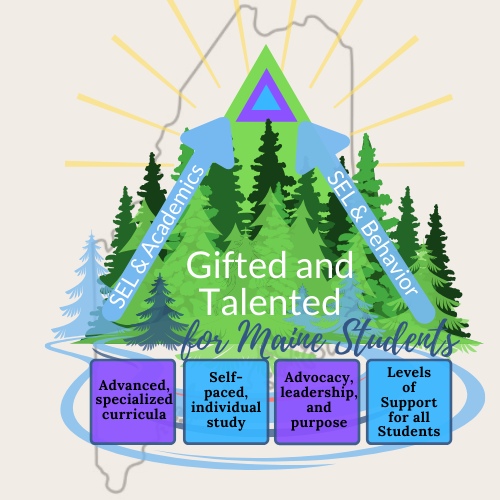Resources
You can find additional MTSS-GT resources by clicking here.
Focus on Educational Equity
It is the philosophy of the Maine Department of Education that all Maine students receive equitable access to enriched educational opportunities when evidence of high-performance capacity in intellectual, creative, artistic, leadership, and/or specific academic areas arise in a student's natural learning environment. The Maine DOE is committed to providing supports to schools that assist with establishment and implementation of responsive advanced programming designed to meet the needs of any student in a targeted and flexible way at the time the student needs it most.
Maine’s students across all populations and socio-economic environments can and do possess exceptionalities in all academic areas or in only one academic area including artistic abilities and leadership abilities. A well-developed multi-tiered system of support can assist the education of high-capacity learners by incorporating targeted needs assessment of students, ongoing screening, and established processes designed to monitor each students’ progress within the responsive system of support.
Like all students, Maine's highest capacity students need differentiation in their class work all day, every day. Using multi-tiered systems of supports Maine schools can meet the needs of these learners in a deliberate and responsive way. MTSS-X is a framework that addresses the academic, social and emotional, and behavioral needs of accelerated learners within three distinct levels of instruction and intervention.
Where do high ability learners fit within the MTSS Structure?
Incorporating supports for accelerated learners into your MTSS Framework has shown to be highly effective at meeting not only the needs of high ability students, but has also shown to increase access and equity for all students. Check out how some of our fellow states have addressed high ability and accelerated learners below.
The Maine Department of Education is dedicated to providing LEA’s with resources to assist in developing gifted and talented programming designed to meet the unique needs of Pk-12 students who excel or have the potential to excel more quickly in school. Maine’s gifted and talented students may be found across all populations and socio-economic environments and can include exceptionalities in all academic areas or in only one academic area including artistic abilities and leadership abilities. A well-developed GT program will incorporate needs assessment of students, ongoing screening, and established processes designed to monitor each students’ progress in the GT system of support.
is dedicated to providing LEA’s with resources to assist in developing gifted and talented programming designed to meet the unique needs of Pk-12 students who excel or have the potential to excel more quickly in school. Maine’s gifted and talented students may be found across all populations and socio-economic environments and can include exceptionalities in all academic areas or in only one academic area including artistic abilities and leadership abilities. A well-developed GT program will incorporate needs assessment of students, ongoing screening, and established processes designed to monitor each students’ progress in the GT system of support.
Like all students, GT students need differentiation in their class work all day, every day. Using multi-tiered systems of supports, Maine schools can meet the needs of these learners in a deliberate and responsive way. MTSS-GT is a framework that addresses the academic, social and emotional, and behavioral needs of accelerated learners within three distinct levels of instruction and intervention.
Tier 1: Universal Supports. A tier 1 setting includes instruction given to all students in the classroom. The majority of students needs are met within this tier. Differentiation for GT students in the tier 1 setting include: pre-assessment, learning contracts, independent study design, modifying instruction for depth and complexity, coaching on higher-order thinking, and strategic flexible grouping.
Tier 2: Targeted acceleration. A tier 2 setting includes additional academic supports designed to help high-achieving students extend their learning goals when they have achieved their learning goals in the tier 1 setting and require further opportunity to accelerate. GT tier 2 supports may be provided by qualified staff including individualized work with qualified staff, increased intensity and rigor in programming, practice, or monitoring.
Tier 3: Intensive acceleration. In some cases, a student will require tier 3 interventions. This level of intervention involves significant changes to student learning experiences and is addressed on a case-by-case bases aligned with student academic, social and emotional, and behavioral needs.
States across the United States are incorporating their accelerated learners into a comprehensive MTSS
- Select a State to Explore
